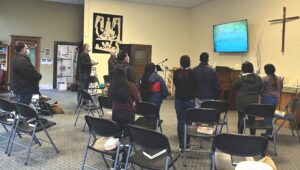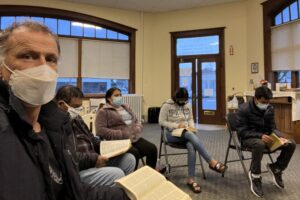 Last Sunday we had a breakthrough day as we started a new Spanish Worship service (3-4:15pm). Ten people showed up, all farmworkers who’ve worked the harvests here in the Skagit Valley for many years. We worshipped using the flat screen TV and Spanish Youtube worship songs, followed by a Bible study, prayer and communion.
Last Sunday we had a breakthrough day as we started a new Spanish Worship service (3-4:15pm). Ten people showed up, all farmworkers who’ve worked the harvests here in the Skagit Valley for many years. We worshipped using the flat screen TV and Spanish Youtube worship songs, followed by a Bible study, prayer and communion.
We read and discussed together Luke 8:40-56, the story of Jesus healing a woman who’d bled for twelve years and raising from the dead the synagogue official Jairus’ twelve-year-old daughter.
In this story the synagogue official Jairus, falls at Jesus’ feet, and publicly begs him to come to his house as his twelve year old daughter was dying. Since there were a few youth and young women present, I asked if anyone there was by any chance twelve years old. One of the fathers raised his hand, pointing to his twelve-year-old daughter, who he told us had chronic leg pain. The girl shyly looked up and nodded, and we continued reading.
In the story Jesus heads off to Jairus’ house, crowds pressing in against him. A woman suffering from twelve years of bleeding approaches him secretly from behind, touching the fringe of his cloak. Direct, even secret contact with Jesus brings immediate healing. We read how Jesus stops, publicly asking: “who touched me?” The woman comes trembling, falls down before him, and tells why she’d touched him and how she was immediately healed.
There before the crowd Jesus lifts her shame, publicly crediting her faith for the healing: “Daughter, your faith has made you well; go in peace” (Lk 8:48).
The contrast between the more powerful synagogue official Jairus, who falls at Jesus’ feet begging for help versus the lowly woman’s falling before him, already healed but “caught” (or discovered) is not lost on our farmworker friends. I suspect they were moved by the woman’s immediate healing despite her “illegal” act of touching Jesus, making him impure due to her blood flow, and him calling her “daughter.” But I cannot see the expressions on their faces due to everyone being masked.
I hope that Jesus’ stopping for the unnamed woman, giving her voice and affirming her faith before the crowd and us as readers today brings them hope. Farmworkers are used to being in the lowly and vulnerable position before those more powerful: their children’s teachers, employers, physicians, law-enforcers, ministries, pastors and priests, judges, and landlords.
They experience public shame before the powers and the public when they cannot speak English, lack understanding about how our systems work, or need to stand up for their rights. I can tell that Jesus is getting through to them by their eagerness to volunteer to read the next verses, which describe the fate of the more powerful Jairus’ twelve-year-old daughter.
We read about how someone came from the synagogue official’s house to tell him: “Your daughter has died; do not trouble the teacher anymore.” The shame around “troubling” the teacher with a request, especially now that it’s too late is upsetting. Will Jesus prefer the powerless woman and leave the request of the more powerful unanswered? What will he do?
Jesus moves quickly. “Do not be afraid any longer. Only believe. and she will be made well” (Lk 8:51), he says, for all to hear.
Though there’s no sign that the official believes, Jesus goes to the house. He publicly minimizes the girl’s condition and whatever he would do next by saying: “stop weeping, for she has not died but is asleep.” Then he doesn’t respond when the mourners mock him. Jesus next only allows three of his disciples and the girl’s parents to enter the room where the dead girl lies. We too are allowed in, to see what Jesus will do in private.
Jesus takes her by the hand, in contrast to the woman who touches the fringe of his cloak. He calls (phoneo) to her- and the Greek word means “to cry out or shout”– possibly giving the impression to mourners overhearing that he’s “waking her up.” He says to her “child, arise!”
The girl’s spirit returns and she gets up immediately. Jesus gives orders to give her something to eat. The parents are amazed. The story ends with Jesus instructing them all to tell no one what had happened.
The humility and tenderness of Jesus towards Jairus and his twelve-year old daughter is so moving. In publicly minimizing the gravity of the girl’s condition, ignoring mockery, and ordering witnesses to tell no one what happened, he’s taking all attention off himself as the hero. This effectively sets the stage for the elevation of Jairus’ status as synagogue official and father.
Jesus’ secretive resurrection of the girl could be seen by his community as the direct result of Jairus “not fearing but believing.” Jesus doesn’t take the place of the girl’s father as he doesn’t call her “daughter” as he had done with the woman. And Jesus’ discretion protects the young girl’s privacy.
It’s so beautiful to see how brilliantly Luke describes Jesus’ dignifying elevation of lowly people defeated and shamed by suffering and death. Jesus continues his mission now and welcomes our participation, not wanting us to remain as onlookers.
As I wrap up the Bible study, I ask if anyone wants prayer. Immediately the twelve-year-old girl stands and comes up to me– likely in response to something her mom and dad whispered to her in Triqui, their native language.
We gather around the girl and speak words of healing over her leg in Jesus’ name, followed by prayer for others. We then gather in a circle celebrate the Lord’s Supper together with individually-wrapped communion elements.
With hearts glowing, we say our goodbyes and prepare for our English service. There, Gracie preached on “faith by hearing,” (Galatians 3:2,5), which you’re welcome to listen to below. The parents tell me their twelve-year-old daughter hasn’t complained of any pain all week!
Check out my new podcast: Disciple! Word, Spirit, Justice, Witness here.
